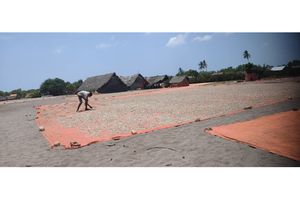Tanzania's drugs control body seizes large haul of ‘super weed’ at border

What you need to know:
- The intercepted drugs, commonly referred to as ‘Skanka’ or super weed, were disguised as innocuous commodities, resembling tea leaves or snacks, and originated from Southern African countries such as Eswatini, Malawi, Zambia, and South Africa.
Dar es Salaam. The Tanzania Drug Control and Enforcement Authority (DCEA) said yesterday that it has intercepted a substantial quantity of enhanced marijuana at the Zambia-Tanzania border.
The DCEA Commissioner General, Mr Aretas James Lyimo, said the intercepted drugs, commonly referred to as ‘Skanka’ or super weed, were disguised as innocuous commodities, resembling tea leaves or snacks, and originated from Southern African countries such as Eswatini, Malawi, Zambia, and South Africa.
Unlike the locally cultivated marijuana, which typically contains around 10 percent tetrahydrocannabinol (THC), the chemically enhanced cannabis seized at the border boasted a THC content exceeding 40 percent, making it four times more potent.
According to official reports, last year witnessed an unprecedented surplus of marijuana production in these Southern African nations, leading to an increase in smuggling activities across Eastern African borders, including Tanzania.
“Through our successful interception at the Zambia-Tanzania border, we confiscated over 600 kilogrammes of packaged enhanced semi-processed marijuana. This is of significant magnitude considering the lightweight nature of dried marijuana leaves,” he said.
He said the modus operandi of the smugglers involved concealing the illicit drugs within shipments of legitimate goods, such as apple crates imported from South Africa. The packets containing the enhanced marijuana were discreetly tucked alongside the fruit boxes, evading detection during routine inspections.
The proliferation of Skanka in Tanzanian communities has raised alarm bells among authorities, with reports indicating adverse effects on the behaviour and mental health of young individuals.
Prime Minister Kassim Majaliwa, speaking recently in Moshi, expressed grave concern over the escalating youth involvement in narcotic drugs, attributing it to the influx of toxicants like Skanka.
The Tanzanian government’s response to this pressing issue involves a concerted effort to enhance border security measures, intensify public awareness campaigns on the dangers of drug abuse, and bolster support for rehabilitation and treatment initiatives targeting affected individuals.
Collaborative endeavors with neighboring countries and regional organizations are deemed essential in curbing the cross-border trafficking of illicit substances and mitigating their detrimental impact on society.




